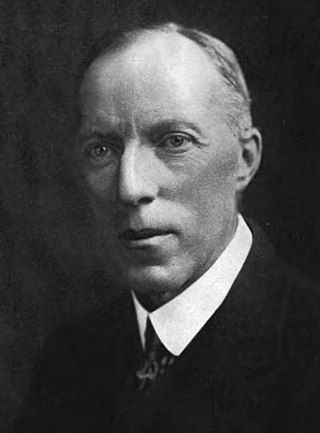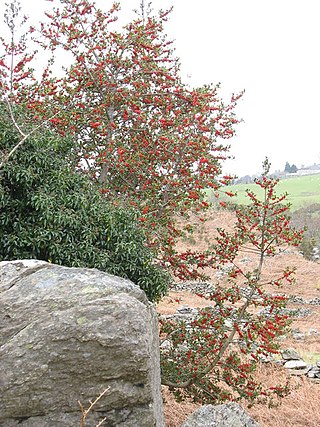"Hush, Little Baby" is a traditional lullaby, thought to have been written in the Southern United States. The lyrics are from the point of view of a parent trying to appease a crying child by promising to give it a gift. Sensing the child's apprehension, the parent has planned a series of contingencies in case their gifts don't work out. The simple structure allows more verses to be added ad lib. It has a Roud number of 470.

Cecil James Sharp was an English collector of folk songs, folk dances and instrumental music, as well as a lecturer, teacher, composer and musician. He was a key figure in the folk-song revival in England during the Edwardian period. According to Roud's Folk Song in England, Sharp was the country's "single most important figure in the study of folk song and music."

"Matty Groves", also known as "Little Musgrave and Lady Barnard" or "Little Musgrave", is a ballad probably originating in Northern England that describes an adulterous tryst between a young man and a noblewoman that is ended when the woman's husband discovers and kills them. It is listed as Child ballad number 81 and number 52 in the Roud Folk Song Index. This song exists in many textual variants and has several variant names. The song dates to at least 1613, and under the title Little Musgrave and Lady Barnard is one of the Child ballads collected by 19th-century American scholar Francis James Child.
"I Saw Three Ships (Come Sailing In)" is an English Christmas carol, listed as number 700 in the Roud Folk Song Index. The earliest printed version of "I Saw Three Ships" is from the 17th century, possibly Derbyshire, and was also published by William Sandys in 1833. The song was probably traditionally known as "As I Sat On a Sunny Bank", and was particularly popular in Cornwall.

"The Holly and the Ivy" is a traditional British folk Christmas carol, listed as number 514 in the Roud Folk Song Index. The song can be traced only as far as the early nineteenth century, but the lyrics reflect an association between holly and Christmas dating at least as far as medieval times. The lyrics and melody varied significantly in traditional communities, but the song has since become standardised. The version which is now popular was collected in 1909 by the English folk song collector Cecil Sharp in the market town of Chipping Campden in Gloucestershire, England, from a woman named Mary Clayton.

"The Raggle Taggle Gypsy" (Roud 1, Child 200), is a traditional folk song that originated as a Scottish border ballad, and has been popular throughout Britain, Ireland and North America. It concerns a rich lady who runs off to join the gypsies (or one gypsy). Common alternative names are "Gypsy Davy", "The Raggle Taggle Gypsies O", "The Gypsy Laddie(s)", "Black Jack David" (or "Davy") and "Seven Yellow Gypsies".
The Roud Folk Song Index is a database of around 250,000 references to nearly 25,000 songs collected from oral tradition in the English language from all over the world. It is compiled by Steve Roud. Roud's Index is a combination of the Broadside Index and a "field-recording index" compiled by Roud. It subsumes all the previous printed sources known to Francis James Child and includes recordings from 1900 to 1975. Until early 2006, the index was available by a CD subscription; now it can be found online on the Vaughan Williams Memorial Library website, maintained by the English Folk Dance and Song Society (EFDSS). A partial list is also available at List of folk songs by Roud number.
The English Folk Dance and Song Society is an organisation that promotes English folk music and folk dance. EFDSS was formed in 1932 when two organisations merged: the Folk-Song Society and the English Folk Dance Society. The EFDSS, a member-based organisation, was incorporated in 1935 and became a registered charity in 1963.
The Farmer's Curst Wife is a traditional English language folk song listed as Child ballad number 278 and number 160 in the Roud Folk Song Index.
"The Knight and the Shepherd’s Daughter" is an English ballad, collected by Francis James Child as Child Ballad 110 and listed as number 67 in the Roud Folk Song Index.
"Blacksmith", also known as "A Blacksmith Courted Me", is a traditional English folk song listed as number 816 in the Roud Folk Song Index.
"Country Gardens" is an old English folk tune traditionally used for Morris dancing. It was introduced by traditional folk musician William Kimber to Cecil Sharp near the beginning of the twentieth century, then popularised by a diverse range of musicians from Percy Grainger to Jimmie Rodgers.

Maud Karpeles OBE, was a British collector of folksongs and dance teacher.
Brian Dawson was a British folk song collector, musician and singer.
The Full English launched in 2013 and is an ongoing English Folk Dance and Song Society (EFDSS) project to create a searchable digital archive of English folk song collections from the early 20th century, thereby preserving and improving the accessibility of these resources. The project is supported by the Heritage Lottery Fund, The Folklore Society, the National Folk Music Fund and the English Miscellany Folk Dance Group. An offshoot of the archive, also in 2013, was an album and concert tour under The Full English name by a collective of UK folk singers.
"The Maid of Amsterdam", also known as "A-Roving", is a traditional sea shanty. It has a Roud Folk Song Index number of 649.
The composer Ralph Vaughan Williams was one of the musicians who participated in the first English Folk Song revival, as well as using folk song tunes in his compositions. He collected his first song, Bushes and Briars, from Mr Charles Pottipher, a seventy-year-old labourer from Ingrave, Essex in 1903, and went on to collect over 800 songs, as well as some singing games and dance tunes. For 10 years he devoted up to 30 days a year to collecting folk songs from singers in 21 English counties, though Essex, Norfolk, Herefordshire and Sussex account for over two thirds of the songs in his collection. He recorded a small number of songs using a phonograph but the vast majority were recorded by hand. He was a regular contributor to the Folk Song Society's Journal, a member of the society's committee from 1904 to 1946, and when in that year the society amalgamated with the English Folk Dance Society he became president of the English Folk Dance and Song Society, a position he held until his death.
The Gloucestershire Wassail, also known as "Wassail! Wassail! All Over the Town", "The Wassailing Bowl" and "Wassail Song" is an English Christmas carol from the county of Gloucestershire in England, dating back to at least the 18th century, but may be older.

Sam Bennett (1865–1951) was an English Morris dancer, fiddler and traditional singer from Ilmington, Warwickshire.







